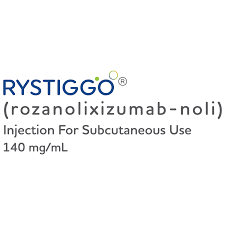RYSTIGGO
Reimbursement Rystiggo
6/27/20232 min read


Adult patients with anti-muscle-specific tyrosine kinase (MuSK) or anti-acetylcholine receptor (AChR) antibody positivity can be treated for generalized myasthenia gravis (gMG) with RYSTIGGO® (rozanolixizumab-noli). Appropriate reimbursement depends on accurate billing and coding. Here's a handbook to help medical professionals:
1. HCPCS Code: J9333: Rozanolixizumab-noli injection, 1 mg. Report the quantity of units based on the dosage given when billing. A dose of 680 mg, for instance, is equivalent to 680 units (680 mg × 1 mg/unit).
2. National Drug Code (NDC): Payers may have different requirements for using an 11-digit or 10-digit NDC. For reference, both formats are offered:
140 mg/mL (280 mg/2 mL) one-dose vial:
Ten-digit number: 50474-980-79 Eleven-digit number: 50474-0980-79
Make sure to confirm with each payer the precise NDC requirements.
3. Drug Administration CPT Codes:
Intravenous infusion (up to 1 hour) for diagnosis, treatment, or prophylaxis (96365).
Every extra hour (list individually in addition to the code for the principal procedure) is 96366.
For instance, use 96365 for the first hour and 96366 for the second hour of a two-hour RYSTIGGO infusion
4. Diagnosis Codes: Verify that the ICD-10-CM codes on the claim support the usage of RYSTIGGO and correspond to the patient's medical condition. Myasthenia gravis without (acute) exacerbation (G70.00) and myasthenia gravis with (acute) exacerbation (G70.01) are common diagnosis.
In addition to supporting medical necessity, accurate diagnosis documentation makes reimbursement easier.
5. Adjustments:
JW: Denotes the quantity of medication that was thrown away or not given to any patients.
JZ: Denotes that no medication has been thrown away or given to a patient.
The Centers for Medicare & Medicaid Services (CMS) mandates that the JZ modifier be used to show that no units of a medicine were wasted as of July 1, 2023. The JZ modifier can be used as early as January 1, 2023, however it is not necessary until July 1, 2023.
6. Documentation Standards: Keep thorough medical records that contain the following information: a precise diagnosis and conformity to accepted standards (such as those set forth by pertinent medical groups).
Weight of the patient, if it affects dosage.
A thorough medical history, particularly if previous therapies have been used.
Accurate documentation promotes medical necessity and makes reimbursement procedures run more smoothly.
7. Other Resources: For more in-depth information, refer to the "Coding and Billing Guide for the Use of RYSTIGGO," which provides reimbursement support resources, example claim forms, and coding insights.
To guarantee correct billing, it's critical to keep abreast of payer-specific regulations and modifications to coding standards.
